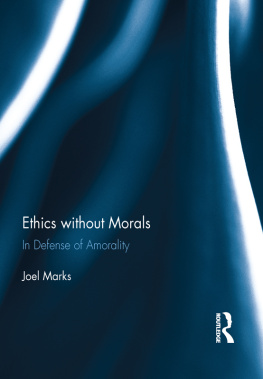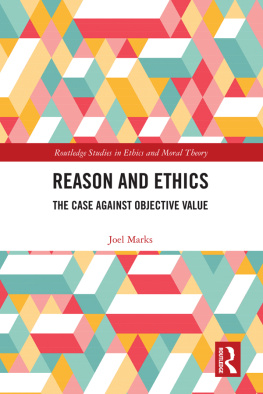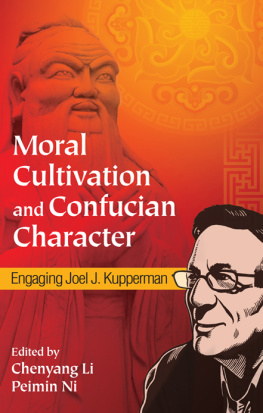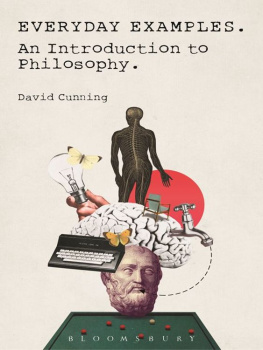All rights reserved.
for giving me the perfect venue to try out all of my ideas.
Preface and Acknowledgments
This book is the third in a trilogy but can be read independently of the two others. It is intended as a laypersons introduction to an original ethical theory, which I call desirism. The theory is based on the premise that there is no such thing as morality, a thesis which I defended in the second book of the trilogy, a philosophical monograph entitled Ethics without Morals . That book was intended for an academic readership, although its style is non-jargony and accessible; still, many of the issues dealt with there are of interest mainly to specialists in ethical theory, and the arguments are backed up by extensive reference to the professional literature.
As it turns out, the first book of the trilogy shall be last, since it has not been published yet. Entitled Bad Faith , it is what I call a philosophical memoir, for it tells the story of my realization of moralitys fictitiousness while also attempting to make the case for it (so that the reader will not think it is the story of a madman). My initial efforts to have this manuscript published proved fruitless, I realize now because it was a hodgepodge. Thus arose my idea to separate out the philosophical defense of amorality in what became Ethics without Morals from the personal testimony. That left a shortened but more coherent memoir of Bad Faith , which I am in process of revising for eventual publication.
Meanwhile, Ethics without Morals , while readily publishable, failed to fulfill my original objective of bringing amorality to a general audience. This was because of both its more technical nature and its cover price, the latter due to the books being marketed to university libraries. That was the final inspiration for my writing the present book, as well as for my method of publishing it: simply to make the ideas more widely available in both style and cost.
But Its Just a Feeling also has a substantive reason for being, since it does indeed advance the discussion of amorality. For the thesis that morality does not exist is a negative one, leaving open the question of whether there could be anything to replace morality. I did deal with that in Ethics without Morals , but did not develop my answer in detail. In a word the answer is desirism. This book spells out what that means in both theoretical and practical terms.
As always I have many people to thank for the final realization of a body of thought as a published book. But this time I will keep it short (as befits a short book). I devoted many pages to proper acknowledgments in Ethics without Morals , covering as well the earlier period of producing the original manuscript of Bad Faith ; and they are available for free inspection at the publishers Website ( http://www.routledge.com/ ). Here, then, I will recognize only a few individuals, who played special roles in this volumes coming into being.
At the top of the list must surely go Vera Huffman and Pamela Stang, both of whom read the manuscript in its entirety and gave me the assurance I needed to go ahead with its publication. Vera provided her usual (but nevertheless extraordinarily) sensitive and insightful commentary, and Pam provided welcome confirmation that what I had written turned out as hoped.
It goes without saying (but I will say it anyway) that Allan Saltzman, Mitchell Silver, and Melanie Stengel have performed their perennial and indispensable roles in this as in all my writing.
Richard Garner and Wendell Wallach have been my continual valued consultants.
I would like to acknowledge the prior discussion and coining of desirism by Alonzo Fyfe and Luke Muehlhauser. I discovered them after independently coining the term, and was much encouraged to receive this degree of validation of ideas that at first were actually troubling (because so novel and counterintuitive) to me. However, in looking over Fyfe and Muehlhausers conception of desirism, I realized we were going different places with it. (Hence, even to refer to it is ambiguous.) To put it succinctly, both Fyfe and Muehlhauser sought to preserve morality, so for them desirism was a theory of what morality really is. I have drawn the opposite conclusion that desirism would serve us better as an alternative to morality.
How much of our differences are merely terminological a distinction without a real difference I cannot say without turning this into a philosophical treatise. That is just the sort of more technical issue I deal with in Ethics without Morals . So for present purposes I will simply leave it up to the reader to decide between these approaches to desirism if s/he wishes to pursue the question. Interestingly, I notice, Muehlhauser has himself more recently soured on using moral language. Bravo! But in the process he has dropped desire as well, albeit for independent reasons (with which I am not, by the way, wholly unsympathetic); but I am not yet prepared, nor feel the need, to take that leap.
Last but certainly not least I am pleased to mention Justin Turner, who contacted me out of the blue a couple of years ago after he came upon my amoralist coming out online. He has been urging me ever since to bring out a longer, accessible, and affordable version of my initial Amoral Manifesto something that would serve not so much as a philosophical defense but as a practical primer. And while that had been my intent all along, the story related above explains why it has taken me so long to fulfill both Justins and my wish. Now at last I offer him this book, and with deep gratitude for his persistence and patience.
And in a way Justin is a stand-in for the many constant readers of my columns in Philosophy Now magazine, whom in recent years I have only had expensive monographs to offer for further reading until now. So my final acknowledgement and thanks go to you, my reader. Without you, I am nothing!
Intro duction
Life is simple. It has seemed otherwise. The main reason for the discrepancy is that we go around thinking and feeling that we ought to do certain things and ought not to do other things, and that we ought not to have done certain things and ought to have done others. Another reason is that we believe certain things are good and others are bad. We also believe that some people are good and others bad, just as we believe that some actions are right and others wrong, and that some paintings are beautiful and others ugly, and some jokes are funny and others lame, etc. But none of this is so that is, not in the sense we often think it is. None of these things is true objectively . They are true subjectively because we do, normally, believe them; so it is a fact that we believe them. But what we believe in these cases are not facts; all of these beliefs are false.
Of course you cannot just take my word for it. Maybe what Im saying is false. In fact patently false, as if Id said you do not exist. What could be more obvious than that some things are right and others wrong, and some things good and others bad? The alternative is literally unthinkable. So my task in this book will be to convince you otherwise. Furthermore, I will do it not to amuse or astound but to suggest a better way to live. That is why this is a book of ethics, even though a central theme is that we would be better off without morality. I claim that morality is not an essential part of human life and society, and in fact is an impediment to a good life and a healthy society.







